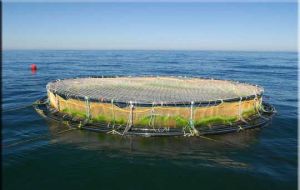MercoPress. South Atlantic News Agency
Chile orders salmon farmers to kill fish infected with ISA
 One of Chile's main industries faces serious virus threat
One of Chile's main industries faces serious virus threat Chile's National Fishing Service (SERNAPESCA) has instructed salmon farmers to kill fish found to be infected with the lethal Infectious Salmon Anemia (ISA), a highly contagious virus that was recently detected on several fish farms in Region X.
SERNAPESCA made the announcement early this week as part of an overall contingency plan aimed at preventing the spread of the disease. In addition to ordering the immediate slaughter or harvesting of infected fish, the government agency ordered farmers to disinfect their facilities and reiterated an earlier ban on transporting fish in and out of the infected zones. Last week, laboratories in Chile and Canada confirmed the presence in Chiloé of ISA. Early reports suggested the disease was detected on just two fish farms – both operated by the Norwegian company Marine Harvest. SERNAPESCA, however, has since acknowledged the presence of ISA on two other Chiloé fish farms. That announcement was echoed by Marine Harvest CEO Alte Eide, who told the Norwegian publication Intrafish that the ISA problem is not limited solely to his company's farms. So far neither SERNAPESCA nor SalmonChile – the country's private producers association – have revealed which companies own the second pair of infected fish farms. It's also unclear at this point whether the ISA outbreak has since spread further still. ISA, not dissimilar to influenza, is a deadly virus that spreads easily and quickly. Symptoms include a paling of the gills, swelling of the liver and spleen, and internal hemorrhaging. Transmission of the disease has also been associated with Caligus, also known as sea lice. Caligus, a major problem in Chile, are parasitic crustaceans that attach themselves to fish, creating lesions that render their hosts susceptible to various diseases, including ISA. According to Dr. Sandra Bravo, a marine biologist from the Chile's Universidad Austral, the illness was first discovered in 1984 on fish farms in Norway, the world's leading salmon producing country. In 1996 ISA was detected in Canada, where it devastated New Brunswick's then-budding farmed salmon industry. Scotland, another important salmon producing country, has had problems with the disease as well. "In 1999 the annual cost of Infectious Salmon Anemia was 11 million US dollars in Norway and 14 million in Canada. In Scotland, meanwhile, the total cost of the epidemic was 32 million between 1998 and 1999", Dr. Bravo explained in an e-mail to the Patagonia Times. SalmonChile has been careful to downplay the severity of the current situation, suggesting in a press release that the Chilean strain of the disease is more benign than ISA elsewhere. The association, nevertheless, reacted favorably this week to SERNAPESCA's new contingency plan, describing it as "an adequate form of prevention for this case or any other health issue of the type that continually affect other food producing sectors." SalmonChile's casual response aside, others – environmentalists, scientists and investors alike – have reacted with alarm to news of the ISA outbreak. "It's worrisome that once again the industry is subject to this type of thing, in this case a virus," Cristián Gutiérrez of the environmental NGO Oceana told the Patagonia Times. "We're also surprised by SERNAPESCA's attitude, because when they're faced with complaints about the (over)use of antibiotics or the use of prohibited substances, they've always reacted more or less cautiously. But when it's something that affects the salmon companies' commercial interests, (SERNAPESCA) reacts immediately with all the resources available to them." According to Gutiérrez, head of Ocean's Salmon Campaign, the ISA outbreak underlines just how vulnerable Chile's salmon producing regions are. For starters, diseases like ISA have the potential to spread like wildfire, particularly in the area around Chiloé, which accounts for 50% of Chile's entire salmon production. A related problem is how absolutely dependent the region is on this one single industry. "You have to understand that in a region where salmon accounts for more than 80% of exports, jobs are the first thing than can be affected by a biological viral attack of this kind. It's worrisome how this could affect the people, the workers and the regional economy as a whole," he said. "The lesson to be learned with this type of emergency is that Chile, particularly in Regions X and XI, ought to be diversifying its productive bases in order not to depend so heavily on this one industry." Also concerned about how the ISA outbreak could affect the regional economy is the National Confederation of Salmon Industry Workers (CONATRASAL). In a press release issued Tuesday, CONATRASAL urged SalmonChile and SERNAPESCA to be more forthcoming with details about the illness, especially as it could directly affect employment in the region. "The workers and the industry have recently been the victims of various fish parasites (namely Caligus) that affect production. For that reason, thinking that this could cost us our jobs, we're worried," said CONATRASAL President Javier Ugarte. "It's a very serious situationâ€Ã‚¦ even more so if there's a possibility of certain companies completely eliminating their prime material." Fish farming is huge business in Chile, where last year producers exported some 2.2 billion US dollars worth of salmon and trout. The figures are all the more phenomenal considering that 15 years ago the country's farmed fish exports were worth just 159 million. Chile is now the world's second leading salmon producer, just behind Norway. Together, the two countries account for approximately 90% of market. A cornerstone of southern Chile's economy, the farmed fish industry is nevertheless subject to frequent criticism from environmentalists, who complain that unregulated farming practices are causing major damage to the country's lakes and coastal waters. By Benjamin Witte The Santiago Times - News about Chile




Top Comments
Disclaimer & comment rulesCommenting for this story is now closed.
If you have a Facebook account, become a fan and comment on our Facebook Page!